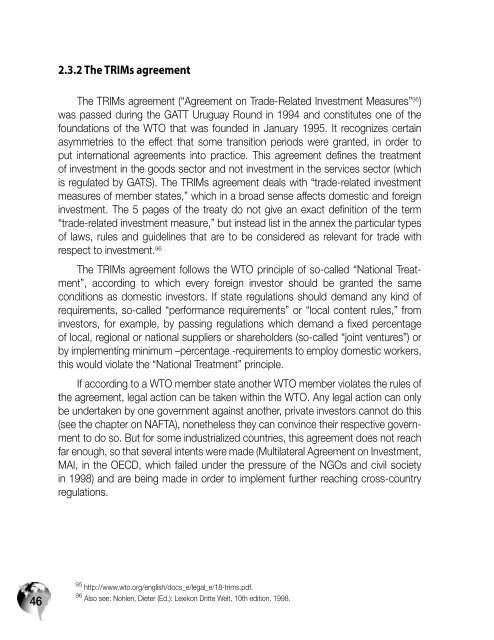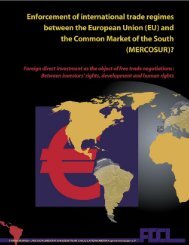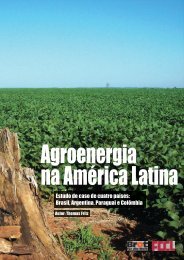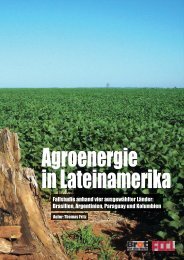(EU) and the Common Market of the South (MERCOSUR)? - FDCL
(EU) and the Common Market of the South (MERCOSUR)? - FDCL
(EU) and the Common Market of the South (MERCOSUR)? - FDCL
You also want an ePaper? Increase the reach of your titles
YUMPU automatically turns print PDFs into web optimized ePapers that Google loves.
46<br />
2.3.2 The TRIMs agreement<br />
The TRIMs agreement (“Agreement on Trade-Related Investment Measures” 95 )<br />
was passed during <strong>the</strong> GATT Uruguay Round in 1994 <strong>and</strong> constitutes one <strong>of</strong> <strong>the</strong><br />
foundations <strong>of</strong> <strong>the</strong> WTO that was founded in January 1995. It recognizes certain<br />
asymmetries to <strong>the</strong> effect that some transition periods were granted, in order to<br />
put international agreements into practice. This agreement defines <strong>the</strong> treatment<br />
<strong>of</strong> investment in <strong>the</strong> goods sector <strong>and</strong> not investment in <strong>the</strong> services sector (which<br />
is regulated by GATS). The TRIMs agreement deals with “trade-related investment<br />
measures <strong>of</strong> member states,” which in a broad sense affects domestic <strong>and</strong> foreign<br />
investment. The 5 pages <strong>of</strong> <strong>the</strong> treaty do not give an exact definition <strong>of</strong> <strong>the</strong> term<br />
“trade-related investment measure,” but instead list in <strong>the</strong> annex <strong>the</strong> particular types<br />
<strong>of</strong> laws, rules <strong>and</strong> guidelines that are to be considered as relevant for trade with<br />
respect to investment. 96<br />
The TRIMs agreement follows <strong>the</strong> WTO principle <strong>of</strong> so-called “National Treatment”,<br />
according to which every foreign investor should be granted <strong>the</strong> same<br />
conditions as domestic investors. If state regulations should dem<strong>and</strong> any kind <strong>of</strong><br />
requirements, so-called “performance requirements” or “local content rules,” from<br />
investors, for example, by passing regulations which dem<strong>and</strong> a fixed percentage<br />
<strong>of</strong> local, regional or national suppliers or shareholders (so-called “joint ventures”) or<br />
by implementing minimum –percentage -requirements to employ domestic workers,<br />
this would violate <strong>the</strong> “National Treatment” principle.<br />
If according to a WTO member state ano<strong>the</strong>r WTO member violates <strong>the</strong> rules <strong>of</strong><br />
<strong>the</strong> agreement, legal action can be taken within <strong>the</strong> WTO. Any legal action can only<br />
be undertaken by one government against ano<strong>the</strong>r, private investors cannot do this<br />
(see <strong>the</strong> chapter on NAFTA), none<strong>the</strong>less <strong>the</strong>y can convince <strong>the</strong>ir respective government<br />
to do so. But for some industrialized countries, this agreement does not reach<br />
far enough, so that several intents were made (Multilateral Agreement on Investment,<br />
MAI, in <strong>the</strong> OECD, which failed under <strong>the</strong> pressure <strong>of</strong> <strong>the</strong> NGOs <strong>and</strong> civil society<br />
in 1998) <strong>and</strong> are being made in order to implement fur<strong>the</strong>r reaching cross-country<br />
regulations.<br />
95 http://www.wto.org/english/docs_e/legal_e/18-trims.pdf.<br />
96 Also see: Nohlen, Dieter (Ed.): Lexikon Dritte Welt, 10th edition, 1998.









